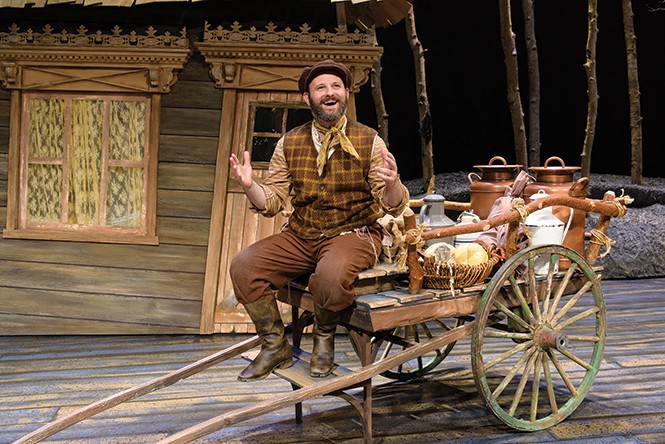Fiddler on the Roof, Wit, Blackberry Winter
Three powerful productions open the new theater season
By Scott Renshaw @scottrenshawPioneer Theatre Co.: Fiddler on the Roof
Great pieces of art are always about more than they are about on the surface. And that's why a production of Fiddler on the Roof—a 50-year-old play based on 100-year-old stories—can still feel so vital and relevant.
Even superficially, it's still a delightfully entertaining piece of musical theater. Joseph Stein's book adapting the stories of Sholem Aleichem captures the charming specificity of the early-20th-century Russian Jewish town of Anatevka, from the telephone-game gossip that renders any piece of news unrecognizable after a few iterations, to the celebratory folk dances in director Karen Azenberg's exhilarating choreography. Then, there are the iconic songs by Jerry Bock and Sheldon Harnick, alternating between giddy playfulness ("Matchmaker, Matchmaker," "If I Were a Rich Man") and meditative cultural reflections ("Sabbath Prayer," "Anatevka").
But there's powerful, challenging material as patriarch Tevye (a warm and wonderful Michael Thomas Holmes) confronts the upsetting of tradition represented by the marriage choices of his daughters: the love match preferred by Tzeitel (Kim Sava); the request for a blessing rather than permission from Hodel (Nadia Vynnytsky); the pairing with a non-Jewish Russian soldier by Chava (Mandy McDonell). In each case, Tevye is forced to consider how much he can bend the rules of the only world he understands in order to accept the choices of the children he loves. It's potent and heartbreaking to understand there are lines even a loving parent feels he can't cross—and as joyful as Fiddler can be while re-creating a long-ago world, there's a different loveliness in showing us where our own world remains much the same.
Wasatch Theatre Co.: Wit
Vivian Bearing (Teresa Sanderson)—a professor of literature specializing in the 17th-century metaphysical poetry of John Donne—uses the precision of language to understand the world. The reality that makes Margaret Edson's Pulitzer Prize-winning Wit so compelling is that when you're faced with Stage 4 ovarian cancer, there's only so much reasoning your way through the situation that you can do.
Sanderson's rich, raw performance is the commanding center of Wasatch Theatre Co.'s production, conveying the way that an intelligent, driven woman gradually comes to terms with her own mortality. There are subtle shifts throughout as the pain Vivian endures through her clinical trial of experimental treatment reduces her to tears, and the proud woman is forced to an unexpected humility in the face of that mortality.
That confrontation with the inevitability of death drives the text in complex ways, most notably in the Donne poems that Vivian has made her life's work. Wit is in some ways a recognition of the ultimate limitations of art to confront that subject—like Dannes's struggles to find the comfort in God's redemption—in addition to the limitations of wit to reduce the terror of the ultimate mystery. Knowledge disconnected from humanity becomes a constant battle, as Vivian's clinical doctor (Nicholas Dunn) has to keep reminding himself to treat her as more than just a collection of data points. And there's beauty in Vicki Pugmire's direction when a kind nurse (Haley McCormick) takes a bit of lotion and gently massages the hands of the dying Vivian. In this magnificent play, the most profound truth could be found in the simple willingness to touch.
Salt Lake Acting Co.: Blackberry Winter
There's a practiced smile on the face of Vivienne Avery (April Fossen) throughout the first half hour of Steve Yockey's new play. Her mother, living with Alzheimer's disease, is in a care facility, and a letter from that facility may be informing Vivienne that it's time to move her to a nursing home. But Vivienne doesn't want to open the letter; she'll focus instead on the ritualistic details of making her mother's recipe for coconut cake, and attempting to make sense of the cruel disease that is taking away her mother by crafting a mythological origin story for how it came to be in the world.
Director Sandra Shotwell's production reaches beyond any limitations in a show that consists almost entirely of one character, occasionally interrupted by the lovely stagecraft of puppeteered cutouts and two onstage cutouts performing Vivienne's fable. The set design by Keven Myhre places every necessary prop on elevated stands, turning Salt Lake Acting Co.'s Chapel Theatre floor into what looks like a museum of the memories Vivienne's mother is losing one day at a time.
Blackberry Winter rises and falls as a wrenching caregiver tale, digging into the unspoken emotions of anyone forced to watch a loved one decline: the helplessness, the misdirected anger, the guilt. Fossen—whose ability to disappear into roles is consistently astonishing—navigates a remarkable transition between that early sense of controlled frustration and the woman who unloads a wallet full of coins that she knows she's going to need for her piggy-bank/swear-jar. The real tears she spills as Vivienne tries to understand what is within her power to control feel like tears she's sharing with everyone who has ever had to hide them behind a practiced smile.
More by Scott Renshaw
-
Film Reviews: New Releases for April 19
The Ministry of Ungentlemanly Warfare, Abigail, The Beast, Hard Miles, Sasquatch Sunset and more
- Apr 19, 2024
-
Faces of Salt Lake County book and portrait reception
Images and personal stories in a new book reveal local demographic diversity
- Apr 17, 2024
-
Feature film review: THE BEAST
A filmmaker's compelling ideas get a bit tangled in references to his creative influences.
- Apr 17, 2024
- More »






